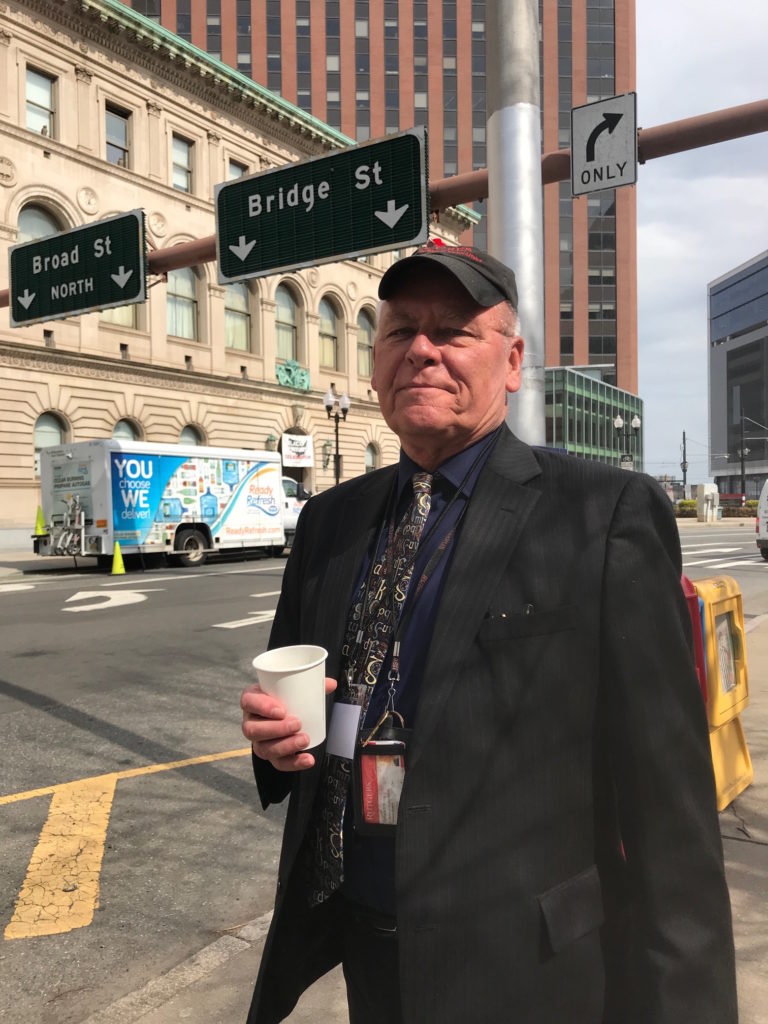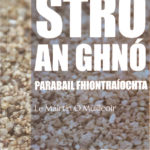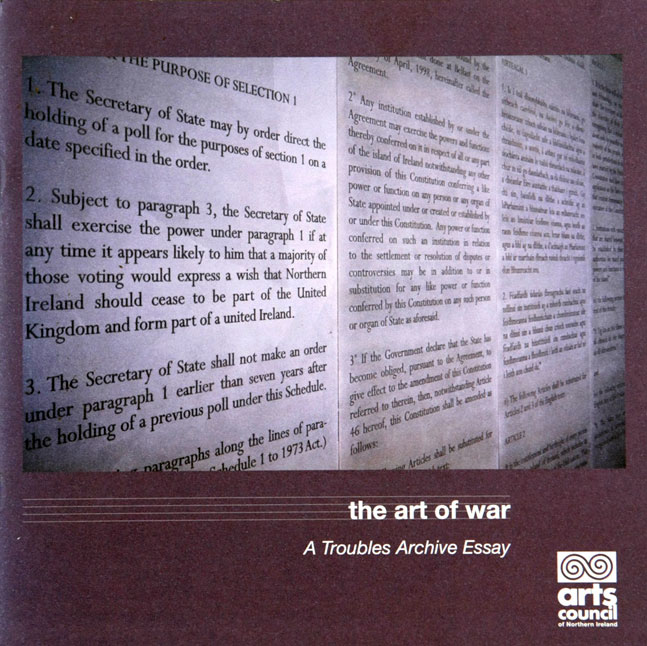Living in each other’s shelter

The following is an edited version of an address I gave to the Rutgers University Division of Global Affairs annual conference in Newark, New Jersey, on Friday 13 April:
Living in each other’s shelter
Míle buíochas – a thousand thanks – to Professor Rick O’Meara, a distinguished Brehon lawyer and advocate for justice in Ireland during darker times, and the faculty at Rutger’s Division of Global Affairs for giving me the great honor of addressing your annual conference.
There is a proverb in the Irish language, ‘Ar scáth a chéile a mhaireann na daoine – we all live in each other’s shelter’. And even though that may seem a preposterous dictum in today’s increasingly dangerous world, it provides a firm platform for those of us who believe in a fairer and more peaceful planet.
Indeed, it provides us with a moral compass with which to navigate global affairs. For, if we believe we are each dependent upon the other, then we should always reach for the solution and the strategy which enhances the commonweal, which advances the public good.
There is, of course, another lens through which we can view the world. We can put our interests, our nation, our community first and heaven help the hindmost. Thus we get America First or Russia First or Britain First or even, God between us and all harm, Ireland First.
And while I believe strongly in the nation state and in citizens’ rights and in the state’s obligations to serve its citizens, it seems to me that this becomes not a race to the top but a race to the bottom.
Neither Globalisation nor 21st Century Empire States serve small countries like Ireland. Our preference will always be for the union of states on the basis of equality and respect in order to lift people from poverty, respect national differences, improve economic performance and avoid conflict. The European Union, for all its faults, represents one such alliance and is why in the North of Ireland a majority is against the Brexit plan to drag us out off the EU.
Like you, I love America. I have loved America since I read my first Spiderman book in the sixties. It’s an affair of the heart which has only deepened since I arrived in your land in June 1978 and emerged from the fascinating chaos of JFK airport to be mesmerized by the sparkling wonder of a New York summer day, the astonishing size of American cars and the pugnaciousness of one of New York’s finest directing traffic. I speak therefore, as a lover and a friend.
But, albeit with the caveat above, I urge you to look at where putting American interests first put the US in Afghanistan. As Steve Coll outlines in his masterful theses ‘Ghost Wars’ and ‘Directorate S’ on the Soviet, then US-NATO intervention in that embattled country, when nations act only in their own interest they are blind to the damage and danger of their actions to others.
But it’s not only the morality of acting as if we all lived in each other’s shelter which is appealing to me. I also recognise that we hang together or hang separately in this challenging and complex world.
In a world which is too often dark, these values push us towards the light. They orientate us towards peace rather than conflict; towards jaw-jaw rather than war-war.
War. What is it good for?
In Belfast and the North of Ireland we have taken as a starting point our resolve to avoid war and conflict. In Belfast we defied the experts who declared our divisions were so entrenched, our problems so intractable that there could never be a peace process.
Ceasefire and peace deal
When the ceasefires of 1994 came, to be followed by the Good Friday Peace Agreement of 1998, they were the greatest gift my generation had ever received.
I grew up in the 1970s when the streets of West Belfast were a war zone with daily gun battles between the volunteers of the IRA and the British Army. When I first entered Belfast City Hall in 1987 at the age of 27, I wore a flak jacket. I was thrown out of my first meeting in the City Chambers by the old police force and in my home I had a gate on the stairway and bars across the doors to deter assassins. I witnessed many attacks on my Council colleagues and walked behind too many coffins: the first Lord Mayor of Belfast from my party was shot in the stomach with a shotgun in 1997; the son of one of my Council colleagues was shot dead; my attorney — Ireland’s most famed jurist — was cut down at his Sunday dinner table. In all these cases, the death squads worked with the blessing and co-operation of the state so-called security forces.
The peace deal of 1998, the Good Friday Agreement, was born from the realization that our awful war was at a stalemate. The British Army with all its personnel, materiel and resources couldn’t defeat the IRA due to the resilience of its support among the community. But neither could the IRA defeat the British Government. The push for peace was also driven by the realization that we had to find a way to share together this small piece of land we call Ireland.
For the geography students among you, Ireland can fit into Texas ten times ‑ and still have room for the rodeo.
The Good Friday Agreement represented a historic compromise. Irish republicans like me accepted that there would only be a United Ireland when a majority in the North of Ireland voted for unity. The British and their allies conceded that until that date, all citizens in the state of Northern Ireland would be treated equally and that the Irish identity would receive ‘parity of esteem’.
Parity of esteem is just another word for what Aretha Franklin calls Respect. You can’t have a successful peace process without respect. You can’t have reconciliation without respect. Respect is the bedrock on which justice rests.
When respect was shown to the nationalist pro Irish-unity community and indeed to former republican combatants and ex-prisoners, the peace process in the North of Ireland blossomed under unique powersharing structures of governance which guaranteed balance. In essence the Good Friday Agreement ensured that, for the first time since the state of Northern Ireland was created in 1921 as the British withdrew from the rest of Ireland, republicans and nationalists did not have to ride at the back of the bus. When fair play was denied, however, things became unstuck. Indeed, it has been the failure to accord that parity of esteem and respect which has led to the most recent challenges to the peace process and the collapse in January 2017 of the government of the North of Ireland — a government which has not now functioned for over a year.
The War is Over
To advance post-Agreement required one mammoth mindset change. It meant accepting that the war was over.
Indeed, those may be the sweetest four words in the English language: The War is Over.
Sadly, to this day, not all our opponents are willing to accept that the war is over.
Some unionists who wish to maintain the link with Britain continue to fight the battles of the past. They say we can’t move on until they are allowed to treat Irish nationalists once again as second-class citizens. Their focus of late has been on the Irish language, a language I speak with my children and in my place of work, which is denied any official recognition in the Northern state — even though such rights and recognition are extended to Gaelic in Scotland and Welsh in Wales within the ‘United Kingdom’. Additionally, they have made the LGBT community the new ‘other’ refusing to sanction marriage equality which is available across the Britain state to which they claim allegiance and which was introduced in the Republic of Ireland after a successful referendum.
Our answer to unionism is simple: we want you to build the peace with us. We want you to look forward and to look outwards; for too long we have been Olympic champions at looking back and looking inwards. If our unionist opponents wish to stay stuck in the past, if they refuse to heal the wounds of history then that is their choice. But the message from the republican and nationalist community in the North of Ireland is that we are moving on and moving up.
Building the new Belfast
In Belfast we have a story to tell about one of the world’s most successful peace processes at a time when the world is crying out for templates to resolve intractable conflicts. Our peace process was and is a crowning achievement of US and EU international diplomacy.
As citizens of Belfast, we wanted to claim our just place in a fractured city which had for too long turned its back on us. But this was our home and we intended to fight for our shared place in this city. For me, that journey included, in 2013 becoming Lord Mayor of Belfast. When I served on the City Council from 1987-1997, I was banned from the parlour and offices of the Lord Mayor — the most revered public space in the city — this time I threw open the doors of that same parlour to everyone.
So what is our vision of a new Belfast? We want to create a city with zero poverty. A city with zero homelessness. A city with zero tolerance of religious sectarianism and racism. A city which affords opportunity on the basis of merit not on the basis of where someone worshipped on a Sunday. A city which is diverse — other nationalities, including refugees, welcomed and gay rights defendeded. A city in which the Irish identity and language are celebrated and promoted as a shared treasure. We have not yet achieved all these lofty aims but we are on the way. Those of us who survived 30 years of war and witnessed the crafting of a miraculous peace process are obliged to ensure, as Martin Luther King exhorted us, “whatever you do you have to keep moving forward”.
Multiculturalism
I am proud to stand with those who led the charge to make Belfast an exciting hub for tourists and for investors with the aim of creating employment and opportunity for all in this city of 330,000 souls.
This year, Belfast will welcome 120 cruise ships and open eight new hotels for tourists. We will welcome 16 college basketball teams from the US to participate in the Belfast Classic and four college ice hockey teams to play competitive games in the annual Friendship Four tournament. The international companies which have established significant European bases in Belfast, creating many thousands of jobs include Citigroup of New York, Liberty Mutual of Boston, and Allstate of Chicago while HBO films Game of Thrones there. And in another turn of the circle, the new Superman TV series is being filmed in a new Belfast studio. The $100m Titanic Visitor Centre has been voted best museum attraction in the world and Boston has signed a sister city agreement with my home town.
A fresh start
The old Belfast industries which were founded on now redundant technologies and often, shamefully, on discrimination against the Catholic nationalist community, have shut up shop. The new wave of US technology companies — UnoSquare of Portland, Oregon, Blackduck of Boston, ShopKeep of New York — have interest only in talent and character and care not a jot for religion or skin colour.
So those of us who want maximum change, who want to create a United Ireland where all are treated equally and with full respect find ourselves being the ambassadors for the new Belfast. It’s our job to ensure the city becomes more cosmopolitan, more industrious, more compassionate, more inclusive, more trend-setting, more international, more attractive to talent, more tolerant to its citizens and more global in its outlook.
For my generation, I don’t think you can exaggerate the influence on our political philosophy of the black civil rights movement. It may surprise you to know that the two iconic moments of history which inspired my determination to stand up against injustice were the sight of Tommie Smith and John Carlos giving the black power salute at the 1968 Olympics and the daily TV reports on the AIM occupation of Wounded Knee in 1973.
Chaplain
When I was Lord Mayor of Belfast, I had a Buddhist chaplain. In fact, I had ten chaplains including of the Jewish, Muslim and Hindu faiths. The Christians got four chaplains because, as you know, in Ireland the Christians argue a lot. It’s my considered opinion that the world would be a better place if everyone had a Buddhist chaplain. Indeed I am happy to recommend to you my now under-employed chaplain Paul Haller, a Belfast man who rose to occupy the highest position in Zen Buddhism in America, the Abbot of the San Francisco Zen Monastery.
When I called him to California and asked him to take on the role of my chaplain, he said he would because he had vast experience of working with hopeless cases.
Paul’s message of not regretting the past — what good does that do? —rang true in a land where the past was often horrific. Instead of harbouring regrets, what we must do, the Buddhists teach us is to heal in the here and now. And of course, healing the wounded and broken people especially after a conflict is blessed work — even I, a person of no great faith, recognize that. And to heal the wounded, we must act with kindness and compassion in the knowledge that we are all connected, that we all live in each other’s shelter.
This week, as we celebrated the 20th anniversary of the Good Friday Agreement, Belfast saluted the pivotal role played by President Bill Clinton and Senator George Mitchell by making them Freemen of Belfast, the city’s highest honour. And it’s fitting that having thrown some brickbats at American foreign policy, I now offer a bouquet: the Agreement which brought peace to my land would not have happened without the US Government and without courageous peacemakers from across Irish America.
There are thousands of people alive today in Ireland who would have perished but for the courage of President Clinton, Senator Mitchell and others.
And so I end with a exhortation, perhaps it’s a prayer, from Belfast’s greatest artist the singer-songerwriter Van Morrison, in my own tribute to those in this country who changed the course of history and made peace possible in mine. I commend its sentiments and I commit myself in the time ahead to giving you shelter just as you provided us with shelter in the form of the Good Friday Peace Agreement. And I look forward to meeting with you again, as Van Morrison sang, on the Bright Side of the Road.
From the dark end of the street
To the bright side of the road
We’ll be lovers once again on the
Bright side of the road



